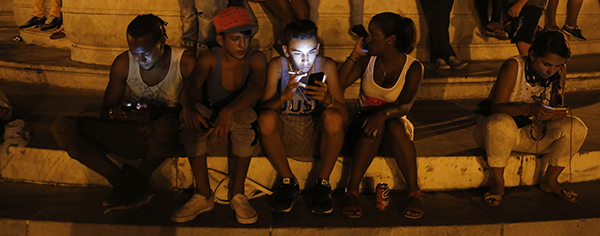Foreword: Contemplating a free press in Cuba
By Ernesto Londoño
A free press, at its best, is the conscience of a nation, an indispensable arbiter of truth and righteousness. When it is doing its job well, a free press unearths unpleasant truths, holds people in power accountable and champions marginalized communities.

At this remarkable juncture in Cuban history, the island would benefit enormously from a freer press.
Yet Cuban journalists remain shackled. The state press is subservient to the ruling Communist Party, which has sought for years to tightly control how Cubans get their news. Independent journalists who do critical reporting have limited reach because only the state is legally entitled to run news organizations and few people have regular, affordable access to the internet.
Nevertheless, as I contemplate the future of journalism in Cuba, I am heartened by the building blocks of a freer press that are already in place. First and foremost is the rich reservoir of talent. The Cuban journalists I have met are passionate, smart, inquisitive, and have a strong grasp of history. Their primary audience—the island’s 11 million citizens—is among the most literate and well educated in the world.
Even in the absence of a legal framework that establishes the right to gather and report news independently several are doing high-caliber and pioneering journalism. I’ve watched with particular admiration the work of the narrative journalism website El Estornudo and the immersive reporting about local issues in Periodismo de Barrio. The independent journalist Yoani Sánchez deserves recognition for the consistently high quality reporting on her website, 14ymedio, which provides readers with stories and perspectives they can’t find anywhere else.
The official press, meanwhile, too often appears stubbornly burrowed into Cold War trenches. It obfuscates far more than it clarifies. It justifies its self-censorship and a belligerent tone by pointing to its anachronistic foils, the largely irrelevant Washington-funded Radio and TV Martí. American taxpayers spend millions each year on subsidizing the Miami-based newsroom, which has had little success in building a sizeable audience on the island. The official Cuban press and Radio and TV Marti have become echo chambers that cater to ideologues on opposite ends of the political spectrum. As currently structured, neither is capable of delivering the type of transformational journalism that could help bring about the changes yearned for by most Cubans.
“The Cuban people deserve answers to numerous pressing questions.”
Ernesto Londoño
Achieving that kind of transformation will require clearer rules of the game. Some Cuban officials have encouraged the press to be more probing and to highlight aspects of the system that aren’t working. Those calls ring hollow without strong legal protections that establish freedom of the press as a fundamental right. They amount to little as long as there continue to be red lines about the questions the press is entitled to ask and the answers government officials are willing to provide.
The Cuban people deserve answers to numerous pressing questions. Among them: why has the government failed to implement a majority of the economic reforms Cuban leaders identified as indispensable years ago? Why does the Cuban military control large segments of the economy and how does it justify the opacity of its finances? Why, exactly, do Cubans continue to live in the digital Dark Ages at a time when the state has the technical capacity to bring millions online in a matter of months? Why don’t ordinary Cubans have more visibility on, and a say in, who will succeed President Raúl Castro when he is slated to step down in 2018? What is prompting tens of thousands of Cubans to emigrate every year?
It would be foolish to expect that substantive answers to these questions will be forthcoming anytime soon. But they would become significantly harder to ignore if more Cuban journalists were asking them. They should. If journalists employed by the state press began seeing themselves as representatives of the people, rather than the Communist Party, these vital questions would become unavoidable. I suggest this while recognizing the substantial risks that come with challenging authority in a police state. Yet, transformational journalism always requires taking risks. For the sake of their country’s future, I hope that more Cuban journalists decide to join those who have already crossed red lines.